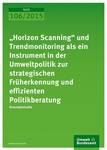„Horizon Scanning“ und Trendmonitoring als ein Instrument in der Umweltpolitik zur strategischen Früherkennung und effizienten Politikberatung
Abstract
Horizon Scanning is an instrument used for the early detection of economical, social, technological, political and ecological changes. Through the conduction of a concept study it was assessed how such an instrument can be used for the early detection of opportunities and risks in environmental policy. Reason for this are promising experiences made in various countries, in which the instrument of Horizon Scanning has already been systematically used. Therefore, relevant concepts and institutional arrangements of other countries have been evaluated for the development of a Horizon Scanning System in the jurisdiction of the Umweltbundesamt. On the basis of this background and own considerations a core concept for a Horizon Scanning System relating to ecological studies and policy has been developed. In a second phase, experiences have been made with identifying and describing overarching socio-ecological trends and new events and the concept has been tried in a test case (with a focus on “sustainable freight transport”). The underlying methodology consists of seven steps: The identification of information needs and the scan field (scoping), choosing both sources and methods and researching topics (scanning), identification of so called ecological topics, an expert discourse, and the production of a scan report (assessing the relevance of the ecological topics). The report illustrates what the work flow for a Horizon Scanning could look like in detail, points out options for IT support and gives suggestions for the gradual introduction of a Horizon Scanning system at the Umweltbundesamt.
Autor*innen
Behrendt, Siegfried; Scharp, Michael; Zieschank, Roland; van Nouhuys, JoForschungsfelder
Bildung und Digitale Medien, Ressourcen, Wirtschaften und Resilienz
